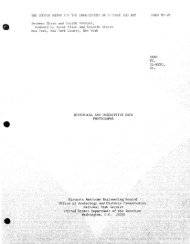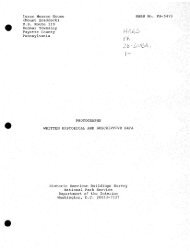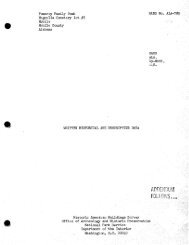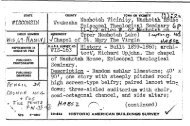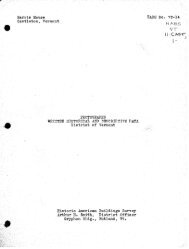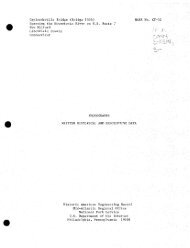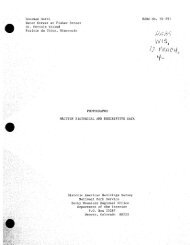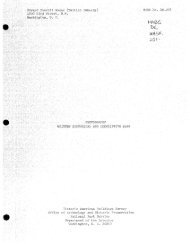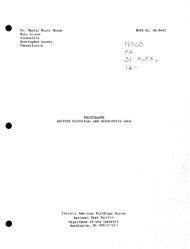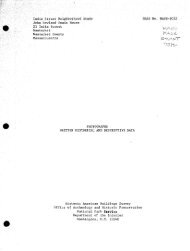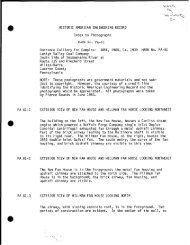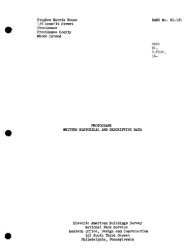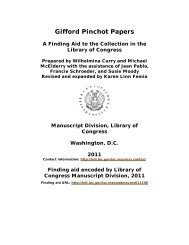pa1778data.pdf
pa1778data.pdf
pa1778data.pdf
Create successful ePaper yourself
Turn your PDF publications into a flip-book with our unique Google optimized e-Paper software.
U.S. STEEL DUQUESNE WORKS<br />
HAER No. PA-115<br />
(Page 27)<br />
programs. His Republican opponent R. W. Schreiber, on the other<br />
hand, called for a continuation of the 'business-like' principles<br />
that governed the city in the past. The result was a comfortable<br />
345 vote victory (2959 to 2614) for Maloy who became the first<br />
Democratic Mayor in the city's history. In 1941, Maloy gained a<br />
second term with a 191 vote margin (3365 to 3213) over his<br />
Republican rival, Frank Kopriver. 34<br />
Maloy's tenure (1938-1946) was marked by the extensive use<br />
of WPA programs for the purpose of paving the remainder of the<br />
city's unpaved streets and by the DPC financed addition of the<br />
electric furnace and alloy bar heat treating plants to the steel<br />
mill's productive facilities. The latter had important<br />
conseguences for the city's physical and political development<br />
because it necessitated the demolition of a portion of Duguesne's<br />
First Ward known as "below the tracks" in 1942. The demolition<br />
of the thirty-eight acre neighborhood, which encompassed fourteen<br />
city blocks and bisected the steel mill, forced the removal of<br />
2474 residents. Many of the evacuees were eventually relocated<br />
in one of several federally-funded defense housing projects, many<br />
of which were located outside the city.<br />
Although Maloy vigorously supported the construction of<br />
additional facilities at the Duguesne Works because of its job<br />
creating potential, the dislocation of many residents cost the<br />
Mayor his political majority. In each of his victorious<br />
campaigns, the basis of Maloy's political support came from the<br />
predominantly working-class neighborhood "below the tracks."<br />
Maloy's attempts for a third term were defeated by Republican<br />
Frank Kopriver in 1945. 35<br />
34 The attitude of Duquesne's GOP officials toward the New Deal<br />
as well as the extensive use of New Deal public works programs in<br />
Pittsburgh and McKeesport can be found in the city council minutes<br />
for those cities between 1933 - 1937; Maloy*s platform and other<br />
Mayoral campaign details appear in The Daily Newsf McKeesport, PA,<br />
June 30, July 14, 15, 16, 19, 21, 23, 26, 29, 31, August 13, 14,<br />
16, 17, 27, 31, September 1, 4, 7, 9, 10, 13, 15, 17, October 22,<br />
25, 26, 27, 28, 29, and November 2, 3, 1937; Beth Shervey,<br />
"Steelmaking and the Growth of Monongahela Valley Mill Towns," 17-<br />
29; The election results of the 1941 mayoral race appear in The<br />
Daily News,, November 5, 1941.<br />
35 For more detailed information on the demolition of the "below<br />
the tracks" neighborhood, the movement of "below the tracks"<br />
residents to homes outside of the city, and the political<br />
ramifications of these events see The Daily News, April 29, May 15,<br />
27, June 19, 28, 30, July 1, 9, 11, 15, 16, 21, 24, 25, 28, 29, 30,<br />
August 9, 16, 18, 19, 20, 23, 25, 26, September 3, 5, 24, October



